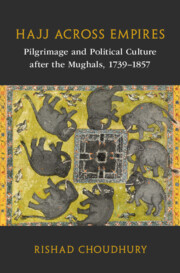
- Publisher:
- Cambridge University Press
- Online publication date:
- February 2024
- Print publication year:
- 2024
- Online ISBN:
- 9781009253673


Rishad Choudhury presents a new history of imperial connections across the Indian Ocean from 1739 to 1857, a period that witnessed the decline and collapse of Mughal rule and the consolidation of British colonialism in South Asia. In this highly original and comprehensive study, he reveals how the hajj pilgrimage significantly transformed Muslim political culture and colonial attitudes towards it, creating new ideas of religion and rule. Examining links between the Indian Subcontinent and the Ottoman Middle East through multilingual sources – from first-hand accounts to administrative archives of hajj – Choudhury uncovers a striking array of pilgrims who leveraged their experiences and exchanges abroad to address the decline and decentralization of an Islamic old regime at home. Hajjis crucially mediated the birth of modern Muslim political traditions around South Asia. Hajj across Empires argues they did so by channeling inter-imperial crosscurrents to successive surges of imperial revolution and regional regime change.
'Choudhury offers a fascinating account of eighteenth- and nineteenth-century Muslims who undertook the hajj, alongside other political endeavors. He describes a region whose interconnectedness is being altered by the collapse of Islamic empires. He depicts an Islam being transformed by an emerging colonial modernity. This is a carefully conceived, wonderfully erudite, and thoroughly researched book.'
Munis D. Faruqui - University of California, Berkeley
'Looking through the prism of pilgrimage, Rishad Choudhury brilliantly illuminates the ways in which mobility across the Indian Ocean inter-regional arena shaped political cultures of post-Mughal regional states in South Asia. A refreshing new perspective on Islamic, oceanic, and global history in the age of overlapping Mughal, Ottoman, and British empires between Nadir Shah’s invasion of Delhi in 1739 and the great rebellion of 1857.'
Sugata Bose - Harvard University
'Elegantly written, this book is about the disintegration of the Mughal Empire, when disillusioned South Asian Muslims turned toward Istanbul and Mecca. The Ottoman sultans were unable to intervene. However, by turning to the Hijaz and the religious networks supporting the pilgrimage, South Asian men of religion, through their trans-imperial voyages, produced a 'new style' revivalist and unified Islamic religious culture. With consummate skill, Choudhury has analyzed these developments in their political context, characterized by the growing power of the East India Company.'
Suraiya Faroqhi - Ibn Haldun University
 Loading metrics...
Loading metrics...
* Views captured on Cambridge Core between #date#. This data will be updated every 24 hours.
Usage data cannot currently be displayed.